
JIAOTONG UNIVERSITY Systems Engineering Lecture 2 Landscape of SE Instructor(s) Prof.Jianjun Gao Department of Automation School of Electronic Information and Electrical Engineering 2014 Spring
Systems Engineering 2 + Landscape of SE Lecture - Landscape of SE Instructor(s) Prof. Jianjun Gao Department of Automation 2014 S i School of Electronic Information and Electrical Engineering 2014 Spring

Today's Agenda a What is System Engineering(SE)? Value of System Engineering History of the System Engineering ■Life-Cycle Stages Career of System Engineer System Engineering by J.J.Gao CLGO 2
+ Today’s Agenda - s Agenda What is Sy g g( ) stem Engineering(SE)? Value of System Engineering Hi f h S E i i History of the System Engineering Life-Cycle Stages Cycle Stages Career of System Engineer 2 System Engineering by J. J. Gao

What is Systems Engineering Systems engineering is an interdisciplinaryapproach and means to enable the realization of successful systems.It focuses on defining customer needs and required functionality early in the development cycle,documenting requirements,and then proceeding with design synthesis and system validation while considering the complete problem: operations,cost and schedule,performance,training and support,test,manufacturing,and disposal.SE considers both the business and the technical needs of all customers with the goal of providing a quality product that meets the user needs. INCOSE SE Handbook V3.2.1 System Engineering by J.J.Gao CLGO 3
+ What is Systems Engineering - What is Systems Engineering System Engineering by J. J. Gao 3
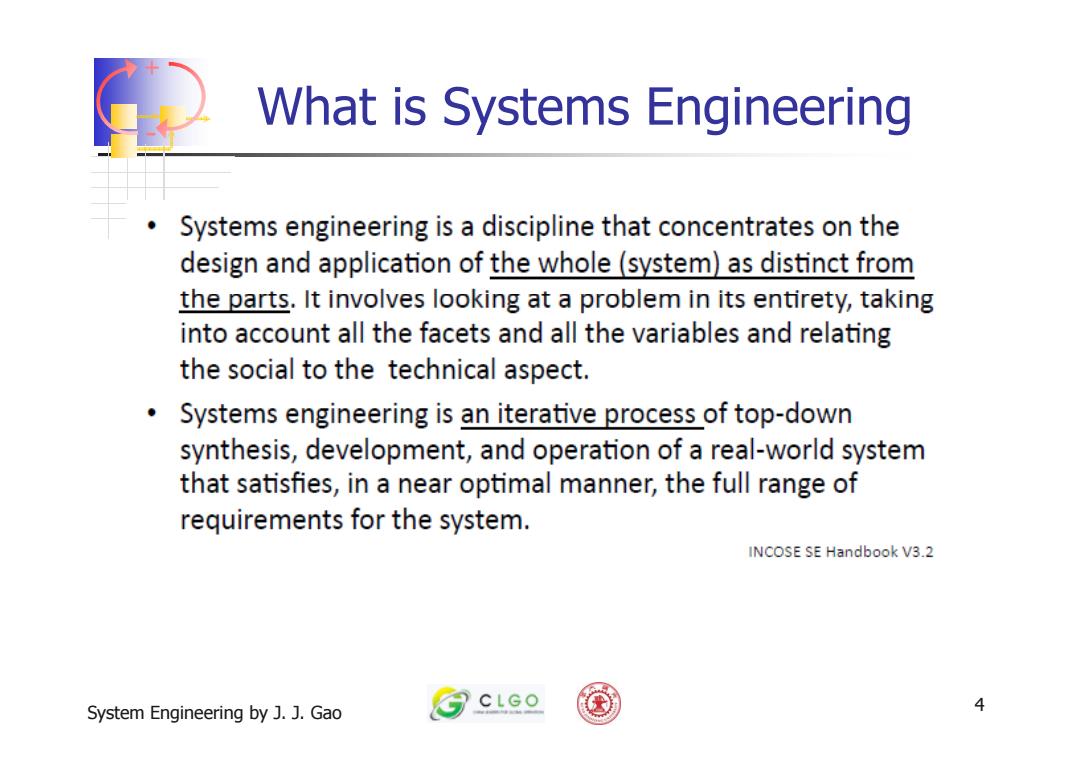
What is Systems Engineering Systems engineering is a discipline that concentrates on the design and application of the whole(system)as distinct from the parts.It involves looking at a problem in its entirety,taking into account all the facets and all the variables and relating the social to the technical aspect. Systems engineering is an iterative process of top-down synthesis,development,and operation of a real-world system that satisfies,in a near optimal manner,the full range of requirements for the system. INCOSE SE Handbook V3.2 System Engineering by J.J.Gao CLGO 4
+ What is Systems Engineering - What is Systems Engineering System Engineering by J. J. Gao 4

What is Systems Engineering Design and Social Development of Large System Complex Systems Natural Technical System System System Engineering by J.J.Gao © CLGO 5
+ What is Systems Engineering - What is Systems Engineering System Engineering by J. J. Gao 5
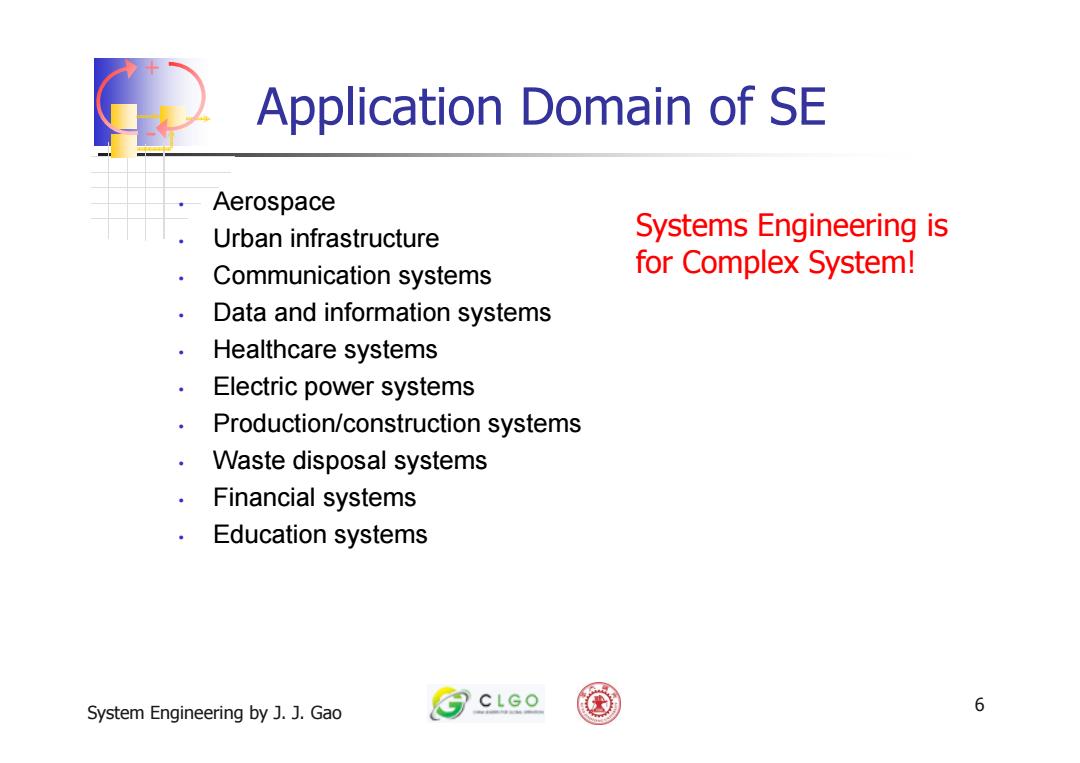
Application Domain of SE Aerospace Urban infrastructure Systems Engineering is Communication systems for Complex System! Data and information systems Healthcare systems Electric power systems Production/construction systems Waste disposal systems Financial systems Education systems System Engineering by J.J.Gao 6
+ Application Domain of SE - • Aerospace Application Domain of SE Aerospace • Urban infrastructure • Communication systems Systems Engineering is for Complex System! • Data and information systems • Healthcare systems • Electric po er s stems Electric power systems • Production/construction systems • Waste disposal systems Waste disposal systems • Financial systems • Education systems System Engineering by J. J. Gao 6
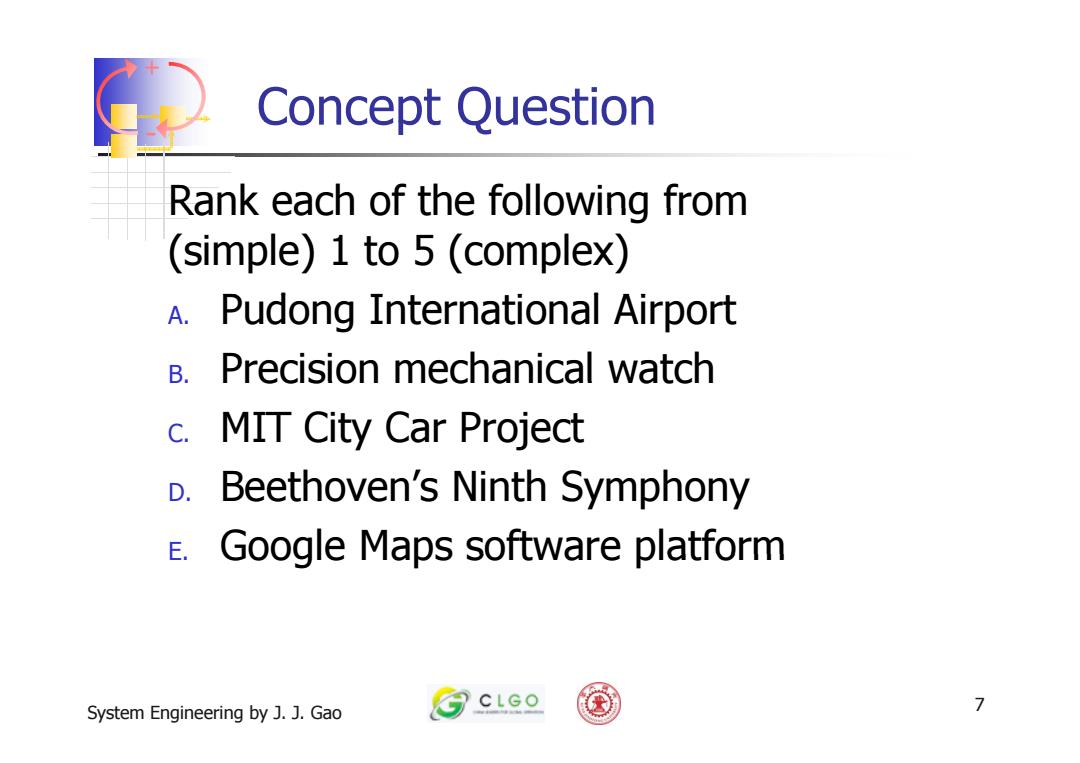
Concept Question Rank each of the following from (simple)1 to 5(complex) A.Pudong International Airport B.Precision mechanical watch c.MIT City Car Project D. Beethoven's Ninth Symphony E. Google Maps software platform System Engineering by J.J.Gao 7
+ Concept Question - Concept Question Rank each of the following from Rank each of the following from (simple) 1 to 5 (complex) A. P du ong I i l Ai International Airport B. Precision mechanical watch Precision mechanical watch C. MIT City Car Project D. Beethoven’s Ninth Symphony E. Google Maps software platform Google Maps software platform System Engineering by J. J. Gao 7
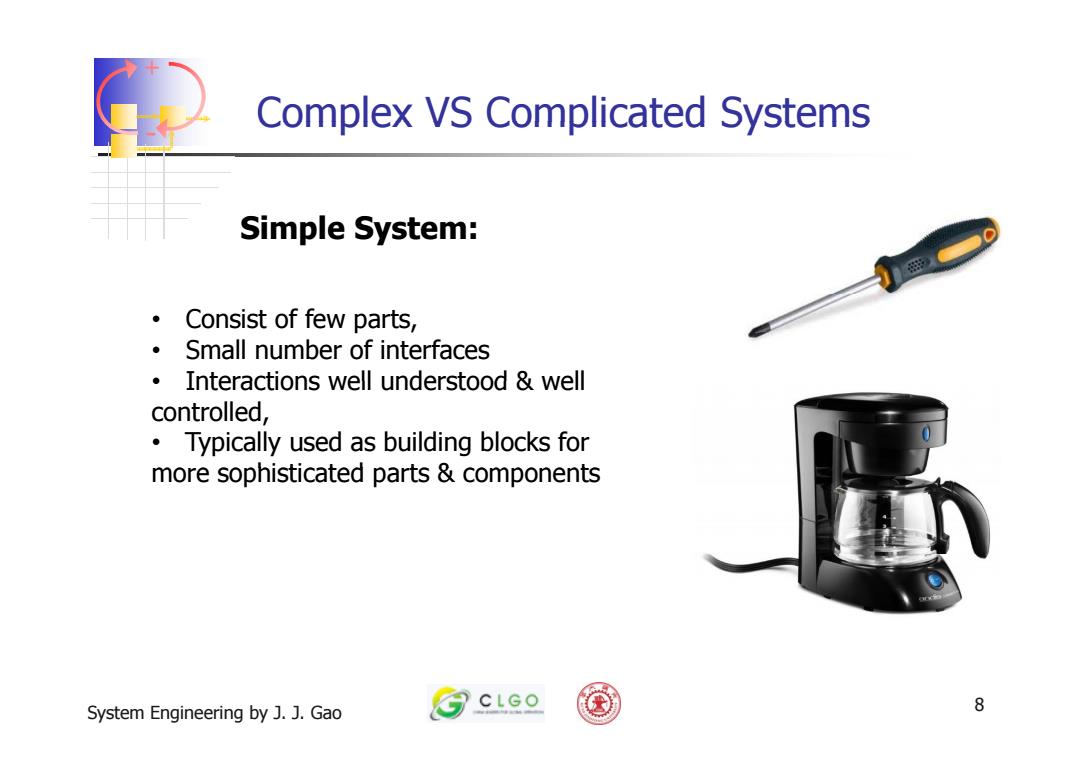
Complex VS Complicated Systems Simple System: 盛 ·Consist of few parts, Small number of interfaces Interactions well understood well controlled, Typically used as building blocks for more sophisticated parts components System Engineering by J.J.Gao CLGO 8
+ Complex VS Complicated Systems - Complex VS Complicated Systems Simple System: • Consist of few parts, • Small number of interfaces • Interactions well understood & well Interactions well understood & well controlled, • Typically used as building blocks for mo e sophisticated pa ts & components more sophisticated parts & components System Engineering by J. J. Gao 8
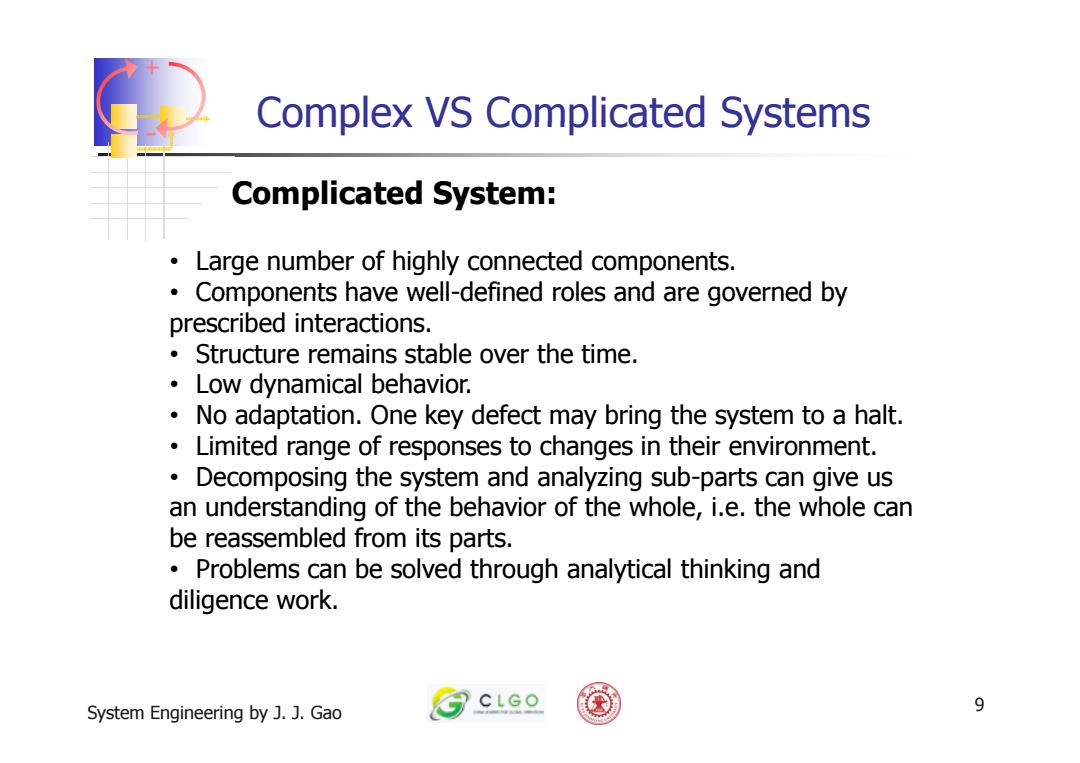
Complex VS Complicated Systems Complicated System: Large number of highly connected components. Components have well-defined roles and are governed by prescribed interactions. Structure remains stable over the time. Low dynamical behavior. No adaptation.One key defect may bring the system to a halt. Limited range of responses to changes in their environment. Decomposing the system and analyzing sub-parts can give us an understanding of the behavior of the whole,i.e.the whole can be reassembled from its parts. Problems can be solved through analytical thinking and diligence work. System Engineering by J.J.Gao CLGO 9
+ Complex VS Complicated Systems - Complex VS Complicated Systems Comp y licated System: • Large number of highly connected components. • Components have well Components have well-defined roles and are governed by defined roles and are governed by prescribed interactions. • Structure remains stable over the time. • Low dynamical behavior Low dynamical behavior. • No adaptation. One key defect may bring the system to a halt. • Limited range of responses to changes in their environment. • D i th t d l i b Decomposing the system and analyzing sub-part i s can give us an understanding of the behavior of the whole, i.e. the whole can be reassembled from its parts. • Problems can be solved through analytical thinking and diligence work. System Engineering by J. J. Gao 9
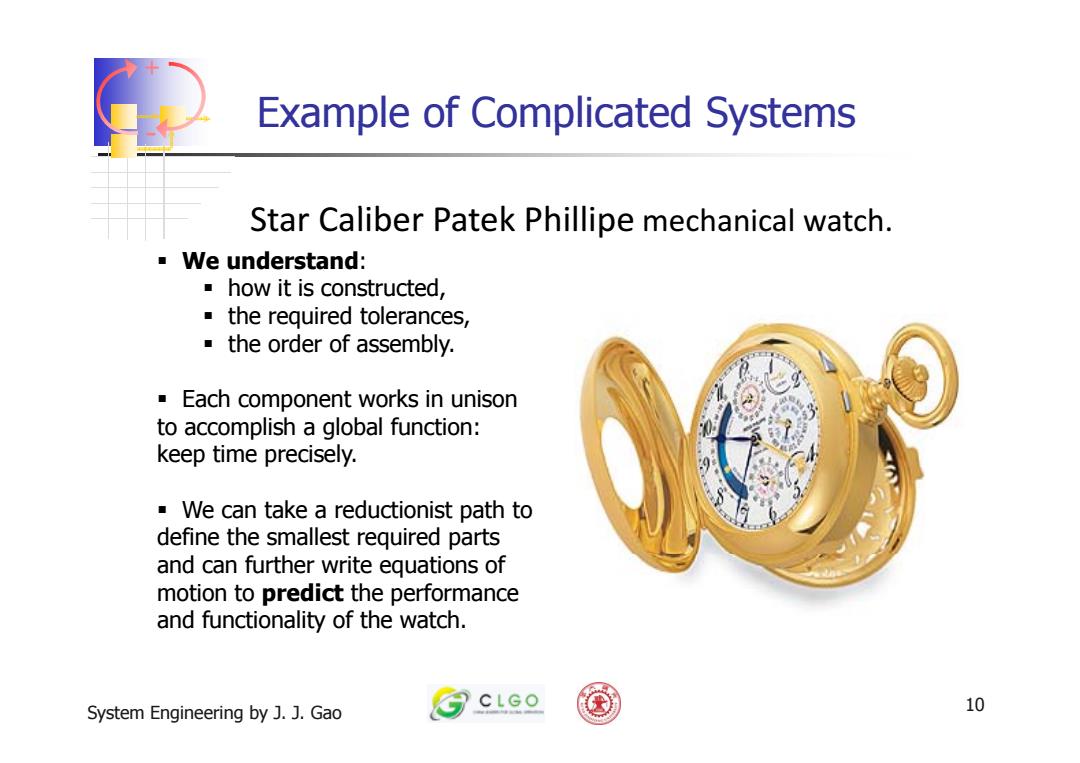
Example of Complicated Systems Star Caliber Patek Phillipe mechanical watch. We understand: how it is constructed, the required tolerances, the order of assembly. Each component works in unison to accomplish a global function: keep time precisely. We can take a reductionist path to define the smallest required parts and can further write equations of motion to predict the performance and functionality of the watch. System Engineering by J.J.Gao CLGO 10
+ Example of Complicated Systems - Example of Complicated Systems Star C lib a er P k ate Phillipe mechanical watch. We understand: how it is constructed, how it is constructed, the required tolerances, the order of assembly. Each component works in unison to accomplish a global function: keep time precisely. We can take a reductionist path to define the smallest required parts and can further write equations of motion to predict the performance and functionality of the watch. System Engineering by J. J. Gao 10